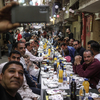[ad_1]

Talha Rafique picks up his to-go suhoor box from a campus dining hall at the University of Southern California. “My friends and I actually look forward to Ramadan,” he says.
Roxanne Turpen for NPR
hide caption
toggle caption
Roxanne Turpen for NPR
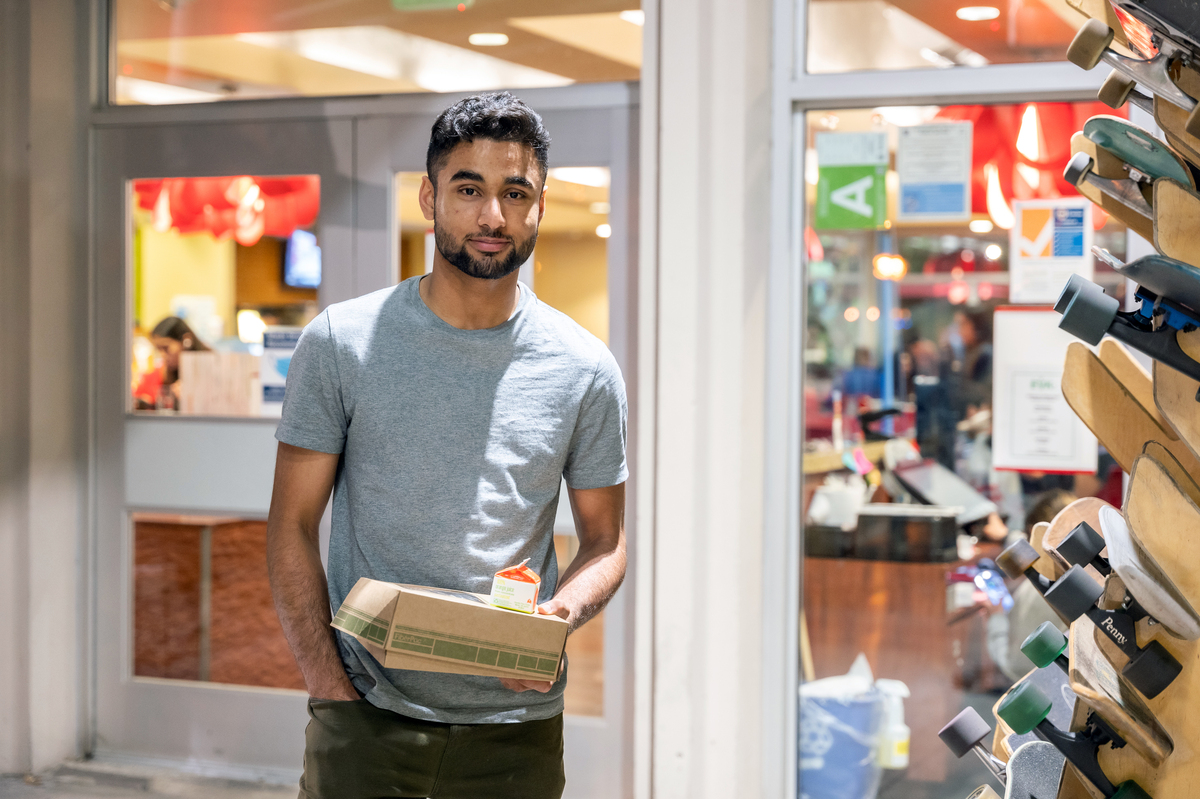
Talha Rafique picks up his to-go suhoor box from a campus dining hall at the University of Southern California. “My friends and I actually look forward to Ramadan,” he says.
Roxanne Turpen for NPR
This Ramadan is Talha Rafique’s first away from home. He says one of the things he misses most is his mother’s food for suhoor, the sunrise meal that begins each day’s fast.
“I was pretty much going to have eggs every single morning,” says the University of Southern California sophomore. Then USC announced a new Ramadan initiative: Students can now pick up to-go boxes from a dining hall for the morning meal.
“That’s super useful, especially for students on the meal plan, because we’re already paying regardless,” Rafique says.
As Muslim students across the country began fasting for Ramadan, colleges have stepped up efforts to make them feel more included. USC, Loyola University Chicago, Utah State University, Northeastern University and Emerson College are among the schools that have launched new initiatives this year.
Shafiqa Ahmadi at USC’s Center for Education, Identity and Social Justice studies students’ sense of belonging on college campuses and teaches workshops on how colleges can be more inclusive.
“We do have administrators and faculty and staff who are listening now,” she says. “Obviously, there’s a push for DEI [diversity, equity and inclusion] and belonging and mattering.”
This year also marks the first time in over a decade that Ramadan has fallen squarely during the traditional school year, and that school year hasn’t been disrupted by the pandemic.
Schools are taking it upon themselves to make Ramadan changes
In previous years, USC students were able to bring extra food from their evening meal home to eat for suhoor.
This year, with increased demand, the university began offering suhoor to-go boxes packed with a breakfast entree, fruit, yogurt and juice, instead of last night’s dinner.
“Honestly, there was never really a debate as to whether we should or shouldn’t offer something,” says Lindsey Pine, a dietitian for USC’s dining halls. “We just knew that that was something that needed to be done.”
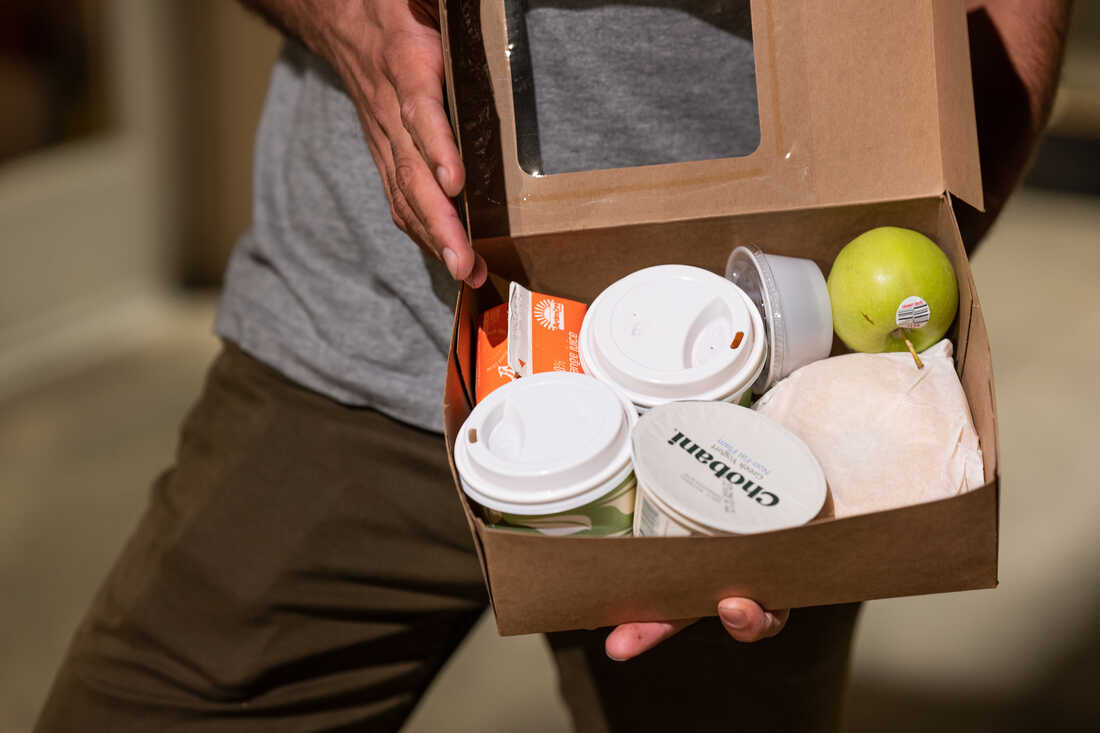
“I think if you look at it like this is going to be really hard to not eat or drink all day, then it will be,” Rafique says of fasting for Ramadan. “But if you look at it like it’s an opportunity to practice control and self-discipline, then you’re going to be OK.” This Ramada, he’s been enjoying USC’s suhoor to-go boxes packed with a breakfast entree, fruit, yogurt and juice.
Roxanne Turpen for NPR
hide caption
toggle caption
Roxanne Turpen for NPR

“I think if you look at it like this is going to be really hard to not eat or drink all day, then it will be,” Rafique says of fasting for Ramadan. “But if you look at it like it’s an opportunity to practice control and self-discipline, then you’re going to be OK.” This Ramada, he’s been enjoying USC’s suhoor to-go boxes packed with a breakfast entree, fruit, yogurt and juice.
Roxanne Turpen for NPR
She says USC plans to continue offering annual Ramadan accommodations as long as the dining halls are open and Muslim students are on the school’s meal plan.
Northeastern University is also offering Ramadan breakfast boxes, as well as a shuttle service to a nearby mosque for evening prayers, and iftar, or fast-breaking, meals twice weekly. And Utah State University is offering hot, halal evening meals twice a week for free, in addition to the to-go boxes they’ve offered in previous years. At Emerson College, a dining hall has a halal station offering food for iftar as well as takeaway bags for suhoor. This year also marks the first time the school has a Muslim chaplain on staff.
Omer Mozaffar, the Muslim chaplain at Loyola University Chicago, a Jesuit Catholic school, has been working with the university to make dining arrangements for students in residence halls, and to facilitate iftars, some of which would be sponsored by the school.
“We actually started doing preparation two years ago,” says Mozaffar. “Then COVID hit.”
This year marks the first time Loyola students will be fasting on campus since the pandemic began. Boxes of dates, typically eaten to break the fast, are stacked high in Mozaffar’s office. He says they are a gift from the university for him to hand out to Muslim students.
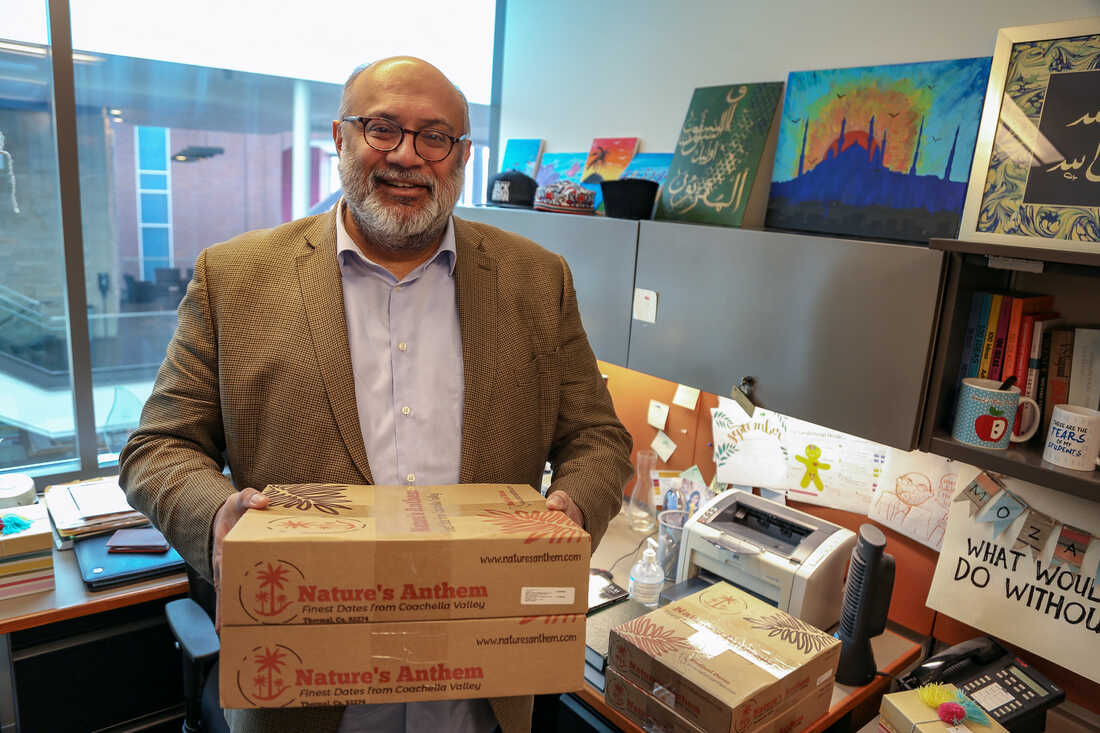
Omer Mozaffar, Loyola University Chicago’s Muslim chaplain, holds boxes of dates in his office. Dates are typically eaten to break the fast during Ramadan.
Olivia Obineme for NPR
hide caption
toggle caption
Olivia Obineme for NPR
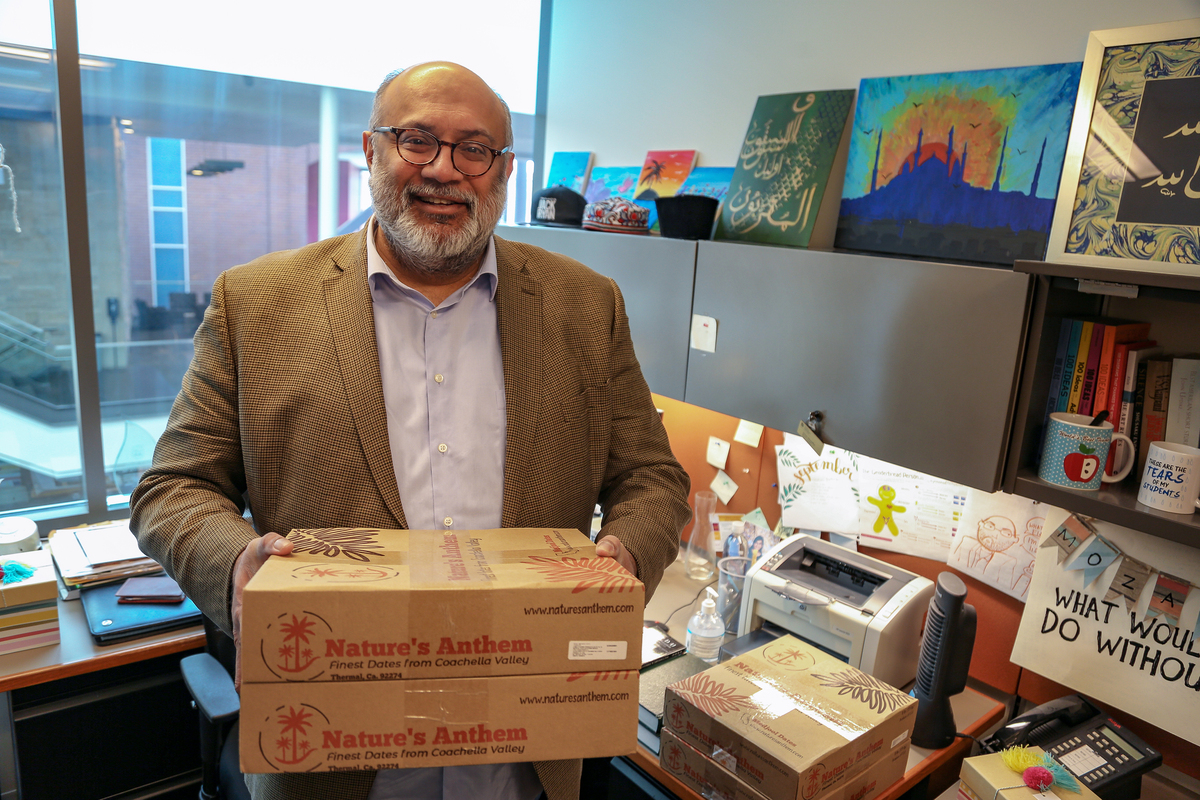
Omer Mozaffar, Loyola University Chicago’s Muslim chaplain, holds boxes of dates in his office. Dates are typically eaten to break the fast during Ramadan.
Olivia Obineme for NPR
“The university historically has been very open and welcoming on matters related to Islam,” he explains. “The dean of students is ready to send out a note to the faculty to let them know that fasting will be taking place and Eid prayers [marking the end of Ramadan] will be taking place afterward.”
HBCUs have been doing this for years
Muslim inclusion efforts aren’t completely new to American college campuses – especially not at HBCUs.
“Many of the Muslim students who attend historically Black colleges and universities tend to feel better supported and more engaged than their counterparts at predominately white institutions,” says Darnell Cole of USC’s Center for Education, Identity and Social Justice.
Cole studies race and how it impacts college students’ experiences, including the experiences of Muslim students at HBCUs – students who, Cole says, aren’t always Black.
Sanaa Haamen leads the Muslim Students’ Association at Howard University, which has offered suhoor and iftar dining hall meals since 2017. She has observed a trend among Palestinian and Bengali students who have transferred to Howard from predominantly white institutions: They’ve told her they feel more included at Howard.
“They came to Howard, and they’re like, ‘Oh, everybody’s just so welcoming. They want to be your friend, they want to network, they want to just get out and do stuff,’ ” she says.
At other schools, students are leading the charge
For years, Muslim student associations have been working toward better inclusion on campus.
“MSAs are built to support Muslim students in terms of their practice on college campuses. And Ramadan is, I think, a central part of that,” says Bushra Bangee of Muslim Students Association West, which oversees MSAs on the West Coast.
More recently, these efforts have been expanding into Greek life. Zara Khan is chapter vice president of the Muslim sorority Mu Delta Alpha at the University of Texas at Austin.
Her sorority has been hosting spirituality nights during Ramadan, a practice they started virtually in 2021 to help foster a communal spirit around the holy month.

Rafique usually takes suhoor, the sunrise meal that begins each day’s fast, around 4:50 a.m. “We literally eat when it’s dark. We have to stop when we see the first light come up,” he says.
Roxanne Turpen for NPR
hide caption
toggle caption
Roxanne Turpen for NPR

Rafique usually takes suhoor, the sunrise meal that begins each day’s fast, around 4:50 a.m. “We literally eat when it’s dark. We have to stop when we see the first light come up,” he says.
Roxanne Turpen for NPR
“We would get together and discuss a relevant topic related to Ramadan, something about fasting or charity work or core components of things you’re supposed to be improving upon during Ramadan,” she explains.
Khan’s sorority is also partnering with the nation’s first Muslim fraternity, Alpha Lambda Mu, to host an iftar at UT Austin’s student-run mosque.
Why colleges are starting to do this now
Bangee attributes the surge of campus inclusion efforts to the events of the past two years, including the response to George Floyd’s murder and the national conversation around racial justice.
“When it comes to administration supporting students, you know, with the past year around BLM, I think that has really opened the door around conversations around DEI in general,” she says.
Sociologist Eman Abdelhadi studies the Muslim-American experience at the University of Chicago. She attributes the uptick in Muslim inclusion efforts to multiple factors, including Muslim advocacy organizations that formed after 9/11 and what she calls the “Trump Effect.”
“He made targeting Muslims such an important part of his campaign,” she explains. “And it in some ways elevated their position within a liberal coalition of anti-Trumpers.”
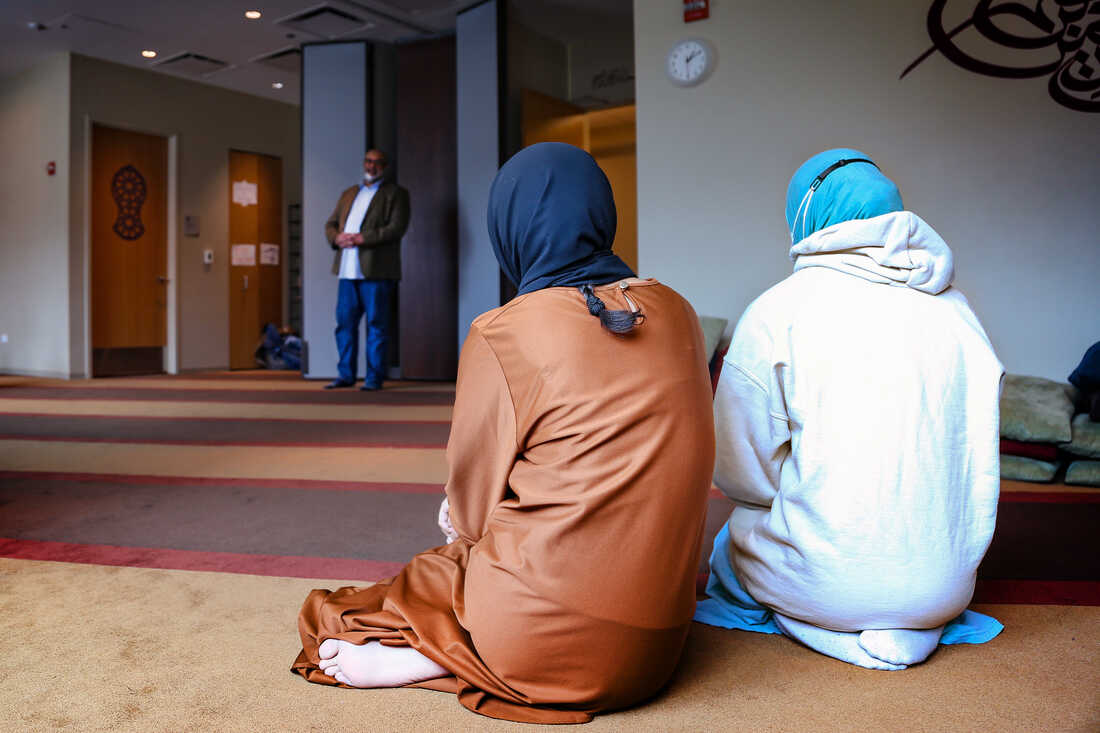
Omer Mozaffar addresses students at Loyola University Chicago’s campus mosque.
Olivia Obineme for NPR
hide caption
toggle caption
Olivia Obineme for NPR
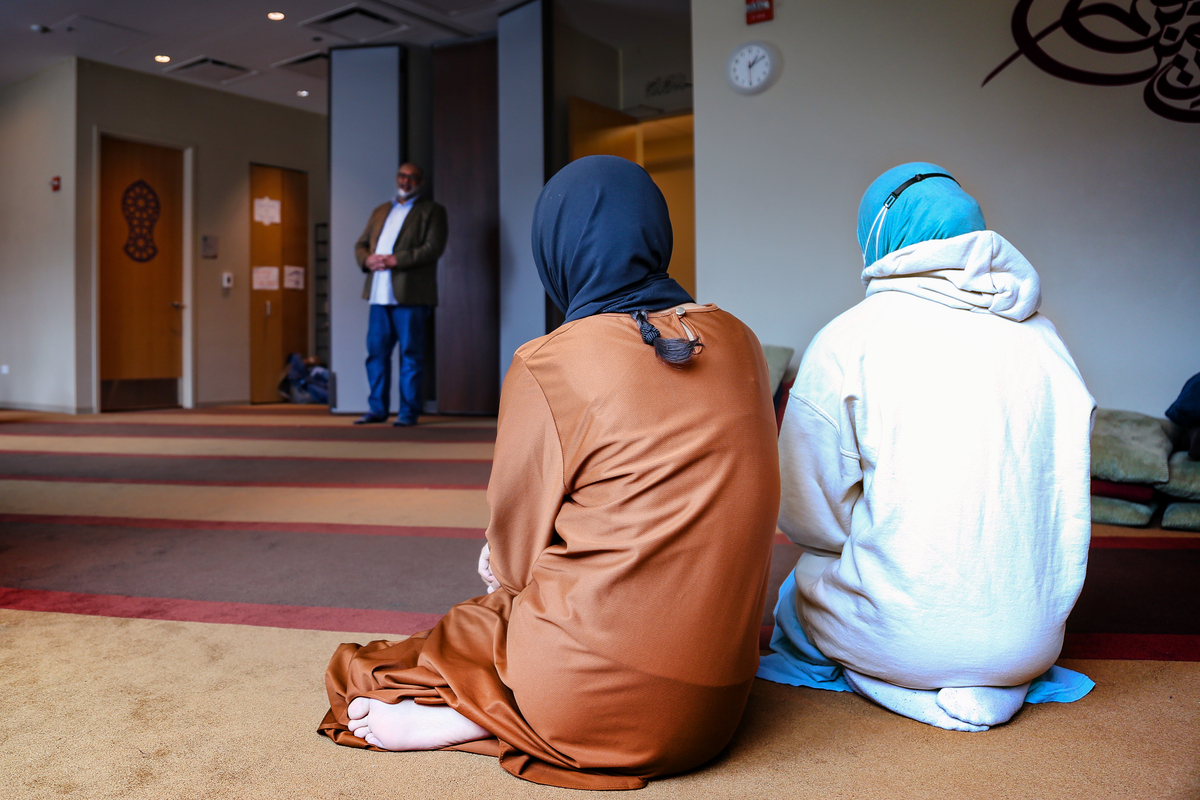
Omer Mozaffar addresses students at Loyola University Chicago’s campus mosque.
Olivia Obineme for NPR
Shafiqa Ahmadi at USC credits Muslim women who wear headscarves with championing change on college campuses.
“It’s a symbol that automatically identifies them as Muslim, and they’re often confronted with bias and hate,” she explains.
Ahmadi says these women have taken up the mantle to push for belonging on college campuses, and it’s made a difference.
Something different for every suhoor
Back at USC, Talha Rafique has gone through several suhoor boxes since Ramadan began. The to-go box menu has included frittatas, bagels and cream cheese, and French toast.
“I get a little bit of a diversity with what I’m eating,” he says.
It’s not quite the same as his mother’s home cooking, but it’s better than the daily eggs he had been planning for.
Yusra Farzan is a multimedia journalist, whose work has appeared in Teen Vogue, KCET and Gulf News. She is also a graduate student at the University of Southern California, where she serves as the managing editor at Annenberg Media and culture editor at Ampersand LA.
[ad_2]
Source link


